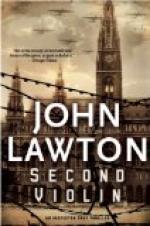The captain knew, as the voice went on, that those barytone notes were very fine ones—knew better than the rest, as having a wider acquaintance with voices in general. But they all understood that it was to no ordinary singer they were listening.
When the song ended the captain reached over and laid a brotherly arm on Doctor Churchill’s shoulder. “Welcome, friend,” he said, with feeling in his voice. “You’ve given the countersign.”
But the doctor, although he received modestly the words of praise which fell upon him from all about, would sing no more that day. It had been the first time for almost three years. And “The Sweetest Flower That Blows” was not only Mrs. Birch’s favourite song; it had been Mrs. Churchill’s also.
“See here, Churchill,” said Lanse, as the orchestra rested for a moment, “do you play any instrument?”
“Only as a novice,” admitted the doctor, with some reluctance.
“Which one?”
“The fiddle.”
“And never owned up!” chided Lanse. “You didn’t want to belong to such an amateurish company?”
“I did—very much,” said Churchill, with emphasis. “But you needed no more violins.”
“If I’m to be away all next year,” said Celia, quickly, “they will need you. Will you take my place?”
“No, indeed, Miss Celia,” the doctor answered, decidedly. “But if you would let me play—second.”
He looked at Charlotte, smiling. She returned his smile, but shook her head. “I’m Second Fiddle,” she said. “I’ll never take Celia’s place.”
The eyes of the two sisters met, affectionately, comprehendingly.
“I should like to have you, dear,” said Celia, softly.
But Charlotte only shook her head again, colouring beneath the glances which fell on her from all sides. “I’d rather play my old part,” she answered.
Jeff caught up and lifted high in the air an imaginary glass.
“Here’s to the orchestra!” he called out. “May Doctor Churchill read the score of the first violin. Here’s to the First Violin! May she hear plenty of fine music in the old country, and come back ready to coach us all. And here’s—”
He paused and looked impressively round upon the company, who regarded him in turn with interested, sympathetic eyes. “I say we’ve called her ‘Second Fiddle’ long enough,” he said, and hesitated, beginning to get stranded in his own eloquence. “Anyhow, if she hasn’t proved this year that she’s fit to play anything—dishes or wall-paper or babies—” He stopped, laughing. “I don’t know how to say it, but as sure as my name’s Jefferson Birch she—er—”
“Hear! hear!” the captain encouraged him softly.
“Here’s,”—shouted the boy, “here’s to the Second Violin!”
Through the friendly laughter and murmurs of appreciation, Charlotte, dropping shy, happy eyes, read the real love and respect of everybody, and felt that the year’s experiences had brought her a rich reward. But all she said, as Jeff, exhausted by his effort at oratory, dropped upon the grass beside her, was in his ear:




